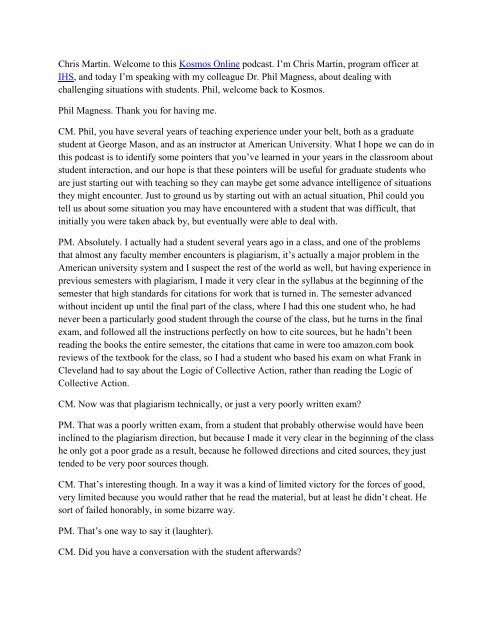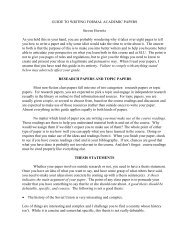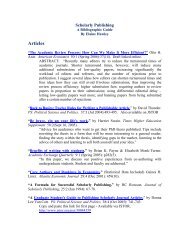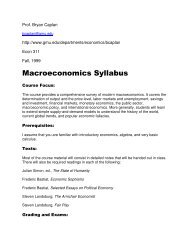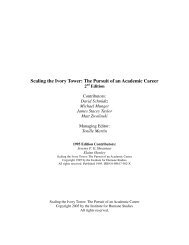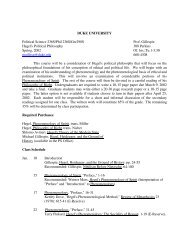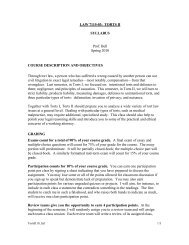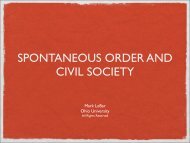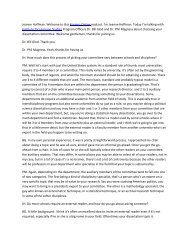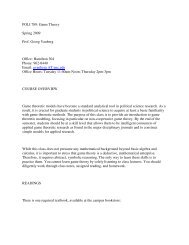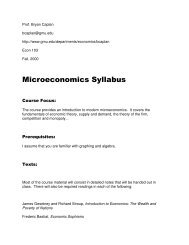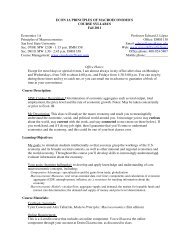Chris Martin. Welcome to this Kosmos Online podcast. I'm Chris ...
Chris Martin. Welcome to this Kosmos Online podcast. I'm Chris ...
Chris Martin. Welcome to this Kosmos Online podcast. I'm Chris ...
You also want an ePaper? Increase the reach of your titles
YUMPU automatically turns print PDFs into web optimized ePapers that Google loves.
<strong>Chris</strong> <strong>Martin</strong>. <strong>Welcome</strong> <strong>to</strong> <strong>this</strong> <strong>Kosmos</strong> <strong>Online</strong> <strong>podcast</strong>. I’m <strong>Chris</strong> <strong>Martin</strong>, program officer at<br />
IHS, and <strong>to</strong>day I’m speaking with my colleague Dr. Phil Magness, about dealing with<br />
challenging situations with students. Phil, welcome back <strong>to</strong> <strong>Kosmos</strong>.<br />
Phil Magness. Thank you for having me.<br />
CM. Phil, you have several years of teaching experience under your belt, both as a graduate<br />
student at George Mason, and as an instruc<strong>to</strong>r at American University. What I hope we can do in<br />
<strong>this</strong> <strong>podcast</strong> is <strong>to</strong> identify some pointers that you’ve learned in your years in the classroom about<br />
student interaction, and our hope is that these pointers will be useful for graduate students who<br />
are just starting out with teaching so they can maybe get some advance intelligence of situations<br />
they might encounter. Just <strong>to</strong> ground us by starting out with an actual situation, Phil could you<br />
tell us about some situation you may have encountered with a student that was difficult, that<br />
initially you were taken aback by, but eventually were able <strong>to</strong> deal with.<br />
PM. Absolutely. I actually had a student several years ago in a class, and one of the problems<br />
that almost any faculty member encounters is plagiarism, it’s actually a major problem in the<br />
American university system and I suspect the rest of the world as well, but having experience in<br />
previous semesters with plagiarism, I made it very clear in the syllabus at the beginning of the<br />
semester that high standards for citations for work that is turned in. The semester advanced<br />
without incident up until the final part of the class, where I had <strong>this</strong> one student who, he had<br />
never been a particularly good student through the course of the class, but he turns in the final<br />
exam, and followed all the instructions perfectly on how <strong>to</strong> cite sources, but he hadn’t been<br />
reading the books the entire semester, the citations that came in were <strong>to</strong>o amazon.com book<br />
reviews of the textbook for the class, so I had a student who based his exam on what Frank in<br />
Cleveland had <strong>to</strong> say about the Logic of Collective Action, rather than reading the Logic of<br />
Collective Action.<br />
CM. Now was that plagiarism technically, or just a very poorly written exam?<br />
PM. That was a poorly written exam, from a student that probably otherwise would have been<br />
inclined <strong>to</strong> the plagiarism direction, but because I made it very clear in the beginning of the class<br />
he only got a poor grade as a result, because he followed directions and cited sources, they just<br />
tended <strong>to</strong> be very poor sources though.<br />
CM. That’s interesting though. In a way it was a kind of limited vic<strong>to</strong>ry for the forces of good,<br />
very limited because you would rather that he read the material, but at least he didn’t cheat. He<br />
sort of failed honorably, in some bizarre way.<br />
PM. That’s one way <strong>to</strong> say it (laughter).<br />
CM. Did you have a conversation with the student afterwards?
PM. I did. I made it clear in academia, you are expected <strong>to</strong> not only use sources reliably, but also<br />
pick your sources credibly, and amazon.com book reviews by Frank in Cleveland do not count.<br />
CM. Do not count. Now, did you ever have that student again?<br />
PM. I did not have that particular student again, but after he left the conversation, he knew why<br />
he got the grade that he did, and was far more accepting of it, just came <strong>to</strong> the realization that<br />
there are standards of expectations for college-level work.<br />
CM. Phil I think you make a good point. Graduate students assume, <strong>this</strong> has been drive in<strong>to</strong> us,<br />
that you have <strong>to</strong> do certain things, but students that come in<strong>to</strong> college these days don’t<br />
necessarily know what the expectations are, so if that somewhat painful experience with that<br />
student inspired them <strong>to</strong> go forward and do no more wrong, that was worthwhile for him. I think<br />
we can count that as a kind of vic<strong>to</strong>ry. So for future classes did you sort of mention that<br />
situation?<br />
PM. Oh I did not only mention that s<strong>to</strong>ry for the plagiarism talk about your sources, but cite good<br />
sources, and here’s an example of what happens when you don’t cite good sources. It made for a<br />
good teaching moment for subsequent classes.<br />
CM. Great, great. In a way, then, it’s almost the perfect outcome, you handled it appropriately in<br />
the moment, a student learned something, and you were able <strong>to</strong> improve your future practice <strong>to</strong><br />
help mitigating against that thing occurring. Actually, Phil, from <strong>this</strong> example, maybe <strong>this</strong> can be<br />
our paradigm for our conversation, what I want <strong>to</strong> propose is certain categories for difficult<br />
student situations that you might encounter for students in the classroom, and then you can share<br />
for us sort of a concrete s<strong>to</strong>ry for what actually happened, and then some of your thoughts about<br />
how both <strong>to</strong> deal with similar situations and how <strong>to</strong> mitigate them in the future.<br />
PM. Absolutely<br />
CM. So I’ll propose some categories and you can let me know if you think those are sufficient. I<br />
have four that I wrote down here: disruptive behavior in the classroom. Second, cheating or<br />
dishonest, which we’ve partially covered. Third, requests <strong>to</strong> bend the rules, students who want<br />
extensions or special treatment. Fourth, honest difficulty in grasping material, so <strong>this</strong> would not<br />
be a question on moral or on ethical behavior, but <strong>this</strong> student is just moving at a different speed<br />
from the rest of the class. Do those seem like four good categories for us <strong>to</strong> cover?<br />
PM. Absolutely<br />
CM. The first one, <strong>this</strong> is probably the most challenging and probably the most common,<br />
disruptive classroom behavior. So start us off with an example where <strong>this</strong> occurred either for you<br />
or for someone you know.
PM. Absolutely. I actually had a colleague that had a very strong example of <strong>this</strong>. We were coteaching<br />
a class as grad students, as Teaching Assistants, but we had each been given a section,<br />
and a student in the classroom decided very early on 1) she did not like my colleague personally<br />
and 2) she did not like the course material, and therefore every time the course turned <strong>to</strong> a class<br />
discussion, she would stand up and raise her hand and just make some over-the-<strong>to</strong>p remark about<br />
why she did not consider even the basic premise of the course even worthy of study. It just<br />
turned in<strong>to</strong> an entirely disruptive scenario for two <strong>to</strong> three weeks on end, <strong>to</strong> the point of dealing<br />
with <strong>this</strong> student, so my colleague asked me for advice, he asked other members of the<br />
department for advice on how <strong>to</strong> deal with her. It ended up being a situation where he had <strong>to</strong> just<br />
set her down aside from class and just say, “Listen, you understand you know you are here<br />
voluntarily <strong>to</strong> take <strong>this</strong> particular class, you are free <strong>to</strong> drop it at any time you like, but if you<br />
continue <strong>this</strong> type of behavior, it’s becoming disruptive and imposing on the other students, and I<br />
hope you just understand that that’s the cost of engaging in <strong>this</strong> type of behavior.”<br />
CM. And what was her response?<br />
PM. From what I was <strong>to</strong>ld, she definitely quieted down at that point and encountered the student<br />
in particular one evening after class several of us decided <strong>to</strong> go get dinner down the street at a<br />
local restaurant, and she also happened <strong>to</strong> be in there with her boyfriend, immediately spotted my<br />
colleague and just stared him out, just staring daggers at him the entire course of the dinner.<br />
CM. This wasn’t a complete success because there was still kind of <strong>this</strong> bitterness, but it sounded<br />
like your colleague did the right thing in trying <strong>to</strong> intervene against that behavior, because that<br />
was probably burning up a lot of class time.<br />
PM. Right, right. To the point that other students were having the value that they derive from the<br />
class impeded upon by <strong>this</strong> one student’s behavior. The best advice they could give there is <strong>to</strong><br />
put a s<strong>to</strong>p <strong>to</strong> it early on, especially if it becomes sufficiently disruptive that other students are<br />
being penalized by it because that’s the real cost of that type of behavior.<br />
CM. Perhaps we could break <strong>this</strong> down a bit more. Now, I don’t have any formal training in <strong>this</strong><br />
area, but I talked <strong>to</strong> someone who was a religious youth group leader, and she had a number of<br />
stages for dealing with behaviors, and I remember the first was <strong>to</strong> privately note the behavior <strong>to</strong><br />
the offending party, the second was <strong>to</strong> confront them aggressively privately, and the third step<br />
was a public confrontation or rebuke, so it was sort of an escalating level of intervention,<br />
eventually using the shame of the peer group against the person. Do you think that would be a<br />
good approach? Have you used that yourself?<br />
PM. Absolutely, it would depend entirely on the circumstance of the student, but if a student is<br />
becoming increasingly disruptive in class and not responding <strong>to</strong> any of the signals that you’re<br />
sending, it may be worthwhile <strong>to</strong> bring the situation out more publicly, at the instance of<br />
disruption in the class.
CM. It would probably depend on how severe the misbehavior was. If it was a situation where<br />
other student being immediately threatened, not just physically threatened but threatened with<br />
some verbal disrespect, you would have <strong>to</strong> intervene immediately. Have you ever had <strong>to</strong> involve<br />
the administration in a classroom disruption issue?<br />
PM. Not directly in classroom disruption, more so with some other problems, with academic<br />
dishonesty, cheating that kind of thing.<br />
CM, But usually with just the misbehavior it’s sufficient <strong>to</strong> correct?<br />
PM. Right, right. You have a group going on, we’ve gotten in<strong>to</strong> some very heated political<br />
debates, the classes I teach are mostly in policy, political science or political his<strong>to</strong>ry, so there’s a<br />
lot of room for disagreement, and people get very passionate about issues, sometimes those<br />
passions overwhelm the discussion, but that’s the point where the instruc<strong>to</strong>r should be the person<br />
who steps in and kind of guides the discussion back on<strong>to</strong> track and 99% of the time that<br />
sufficiently works <strong>to</strong> diffuse the situation.<br />
CM. Now how would you do that? Would you do that with a mini-monologue about the issue<br />
involved, would you pose a question?<br />
PM. Normally, if a student is really going off-base or berating one of his or her colleagues for a<br />
point that was made, that’s the time <strong>to</strong> step in as the instruc<strong>to</strong>r and guide the terms of the<br />
discussion back on<strong>to</strong> more of a civil point. You know, it could even be a comment of saying,<br />
“Let’s keep <strong>this</strong> away from something personal” and on<strong>to</strong> the particular arguments that are being<br />
made.<br />
CM. That’s a great point, and actually as you’ve seen in our IHS seminars, we’ll even say<br />
explicitly at the start of seminars, it’s about the idea, not about the person. It’s not the ad<br />
hominem sort of attack. But you’re right; the instruc<strong>to</strong>r needs <strong>to</strong> be the grown-up in the room, in<br />
a way, for these students…Are there any other strategies can you think of <strong>to</strong> address disruptive<br />
behavior? On the first day of class, do you tell students, for example, when <strong>to</strong> pose questions<br />
during the lecture? Do you say, “hold your questions til’ the end of the lecture, interrupt in the<br />
middle, raise your hand”?<br />
PM. I normally let them know, the first day of class, we have a general talk about the discussion<br />
environment that’s going <strong>to</strong> play out during the course of the semester, I let them know that since<br />
it is a politically-oriented class, there will be times when discussion is appropriate, and that<br />
discussion is in fact welcomed within these boundaries. For a particular class, I normally try <strong>to</strong><br />
structure the lecture, I’ll write it out on the board what I’m trying <strong>to</strong> do, and it’ll be maybe the<br />
first twenty minutes of the lecture are on a particular <strong>to</strong>pic. Then we have time set aside for<br />
discussion and an assignment that follows, so it’s clear before the opportunity even arises, what<br />
the appropriate time is <strong>to</strong> hold that discussion will tend <strong>to</strong> be.
CM. That’s a good system. So the board-based outline. Another issue that comes <strong>to</strong> mind, that<br />
you and I, and many of our listeners, have a classical liberal commitment, I guess you could say<br />
we find those ideas powerful. Have you ever had classroom disruption issues tied specifically <strong>to</strong><br />
the student feeling that you were classical liberal and they were opposed <strong>to</strong> that?<br />
PM. I normally start the classes; I don’t hide the fact that I lean classical liberal. If any student<br />
asks me, “What are your philosophical beliefs?,” I am ready <strong>to</strong> identify in that camp, but at the<br />
same time, I make it known very clearly at the outset of the class that other ideas are welcome. I<br />
want an open exchange, and as long as anyone can articulate their particular position with good<br />
arguments, sound arguments behind it, that’s welcome.<br />
CM. That, I think, is the position that the best instruc<strong>to</strong>rs that I know take. You can be<br />
completely opposed <strong>to</strong> what I, the instruc<strong>to</strong>r believes, it’s the quality of your arguments that<br />
matter. That’s a great rule. I think we’ve probably covered disruptive classroom behavior, so<br />
why don’t we move on <strong>to</strong> issues of cheating or dishonesty. We had one that was sort of a<br />
halfway-there failure <strong>to</strong> grasp the premise, is there another s<strong>to</strong>ry that has <strong>to</strong> do with an actual<br />
transgressions of the rules?<br />
PM. As I’ve said, plagiarism is rampant, in most universities, from the highest level of the Ivy<br />
League all the way down <strong>to</strong> general state universities. Plagiarism occurs, it’s widely discussed in<br />
academia, and I have had several instances of it in the past. One I encountered when I was<br />
teaching a class, a particular student turned in a paper, <strong>this</strong> was a student I had granted an<br />
extension <strong>to</strong> out of extenuating circumstances, had requested extensions. It’s already a late<br />
assignment; I had already given a lot of leeway <strong>to</strong> <strong>this</strong> particular student. She turned in a paper<br />
where, I’m reading through it as she’s meeting in my office in the office hours <strong>to</strong> present her<br />
work, and it became immediately evident that she had plagiarized large portions of <strong>this</strong> paper,<br />
actually lifted them off of a report that had been published by a state government, and she went<br />
through and she changed most of the references <strong>to</strong> that state government <strong>to</strong> another political<br />
jurisdiction, which happened <strong>to</strong> be the <strong>to</strong>pic of her paper.<br />
CM. Not only was it plagiarism, it was actually data that was inappropriate <strong>to</strong> the thesis of her<br />
class, doubly absurd.<br />
PM. The way that I caught <strong>this</strong>, I was reading through her charts and graphs she had concluded<br />
in <strong>this</strong> paper as she was sort-of giving <strong>this</strong> mini-breakdown of it <strong>to</strong> me, and I noticed right away<br />
one of the footers of a chart had the wrong political jurisdiction on it, and I asked her about and<br />
said, “This was kind of strange, <strong>this</strong> chart refers <strong>to</strong> <strong>this</strong> city, and you’re saying it pertains <strong>to</strong><br />
another state.” She didn’t have a very good answer for that, so that was red flag #1 that I should<br />
run <strong>this</strong> through the software that we subscribe <strong>to</strong> as a university for detecting plagiarism. Sure<br />
enough, I did it and immediately afterwards a direct indica<strong>to</strong>r that she had lifted large sections of<br />
her paper directly from an online source.
CM. What action did you take at that point?<br />
PM. So that’s the point when you normally turn <strong>to</strong> either involving the department or the<br />
administration, and each department’s different, they’re going <strong>to</strong> have different policies for how<br />
<strong>to</strong> deal with that kind of a subject. Some departments will handle it internally, others pass it off<br />
<strong>to</strong> somewhere else in the school, normally that takes it out of your hands directly for anything<br />
beyond the grade, but departments tend <strong>to</strong> engage with the faculty member in such a way that<br />
they’ll reach a resolution <strong>to</strong> the case, which either involves assigning whatever the prescribed<br />
grade happens <strong>to</strong> be for plagiarism, or do you take it before an academic review, an intellectual<br />
policy organization that the university itself has set up.<br />
CM. It sounds like once you trigger that official process, which we can presume it’s going <strong>to</strong> be a<br />
little different for every host institution. For people who are listening, your department’s specific<br />
policies would vary and you can discover them, but it does sound like there could be instances<br />
where there’s a bit of a moral choice for you as the instruc<strong>to</strong>r <strong>to</strong> make. Depending on the severity<br />
of the problem, once you trigger that process it’s out of your hands, and it also sounds like it<br />
requires a lot of time and energy on your part <strong>to</strong> engage with the process. Do you think there’s<br />
ever a justifiable circumstance where you might handle it yourself?<br />
PM. Rule of thumb, if it’s a major case of cheating, a major case of plagiarism, that’s when I<br />
would take that step of going through the department procedures. You know, I lay <strong>this</strong> out on my<br />
syllabus, <strong>this</strong> is another good technique, and some departments even require <strong>this</strong>, <strong>to</strong> state in<br />
advance at the beginning of the class, “This is the department policy on plagiarism, if you violate<br />
it, these are the consequences” so that it’s clear in everyone’s mind. In certain circumstances, if<br />
it’s a very minor instance, or if it’s something, you know, it’s questionable if they had a slipup or<br />
maybe they forgot <strong>to</strong> cite a force, and it’s not the thrust of the paper. If they’re turning in a tenpage<br />
paper and there’s a single quotation, I’d handle that differently than if five of the ten pages<br />
were copied off of the internet. It’s really just using discretion on a case-by-case basis, and on<br />
that smaller instance, that may be the appropriate time <strong>to</strong> approach the student directly, see if<br />
there’s a plausible explanation, use common sense.<br />
CM. I think that’s a good point, that you don’t necessarily want <strong>to</strong> drop the hammer on every<br />
individual situation that occurs. I had a challenging problem that I encountered in economics<br />
class. I don’t know, Phil, if you’ll have a suggestion for me here or for our listeners, but a<br />
student, actually two students, Chinese-exchange students folks, so English was not there first<br />
language and they had some particular challenge with the technical vocabulary. They asked me<br />
on an exam if they could use a Chinese-English dictionary, a small hand-held electronic device.<br />
They asked me the day of the exam, and I sort of in the moment said, “Well, let me check it <strong>to</strong><br />
make sure there are no equations s<strong>to</strong>red in here.” Now, of course it was in Chinese, so I was<br />
completely unable <strong>to</strong> verify <strong>this</strong>, and later I thought, “You know, I probably didn’t handle that<br />
optimally. Perhaps what I should have done is advanced a policy about that in advance.” Have<br />
you ever had any similar situations with dictionaries, cellphones?
PM. Not so much straight up with dictionaries, sometimes lap<strong>to</strong>ps even just in the general course<br />
of the class. It’s becoming in vogue <strong>to</strong> have a lap<strong>to</strong>p sitting there in their class. Some will be<br />
surfing Facebook, others will be legitimately taking notes and there is no real way, other than<br />
walking around the back of the classroom <strong>to</strong> know exactly what they’re doing, but you have <strong>to</strong><br />
wonder if you’re giving, you’re holding a discussion in class, and a lot of classes have<br />
participation components in them that are graded, is someone looking up the answer <strong>to</strong> a<br />
particular question on the internet right then and there, is that giving them an unfair crutch? My<br />
way of addressing it is allowing students <strong>to</strong> use their lap<strong>to</strong>p as a valuable <strong>to</strong>ol, but stating up<br />
front that quite aware of the downside, <strong>to</strong> the negative side of <strong>this</strong> <strong>to</strong>ol might abuse it, and if you<br />
become, if it becomes very visible that you are googling the answer <strong>to</strong> every single question<br />
that’s asked, then I may step in and ask you <strong>to</strong> set the lap<strong>to</strong>p aside.<br />
CM. And as long as there’s a credible threat of you doing that, you don’t have <strong>to</strong> do that often,<br />
you just have <strong>to</strong> do it enough <strong>to</strong> make it obvious.<br />
PM. I actually had one professor that I studied under, and he had <strong>this</strong> technique that if he noticed<br />
a student was using his or her lap<strong>to</strong>p <strong>to</strong>o much in class, he would intentionally walk down the<br />
aisle and unplug it as a result (laughter).<br />
CM. That’s an interesting strategy. As long as you don’t knock the computer on<strong>to</strong> the floor.<br />
PM. He was very deft at doing <strong>this</strong>, and it was always a good laugh when it happened.<br />
CM. It’s <strong>to</strong>o bad we don’t have a laser beam <strong>to</strong> disable it, a small EMP device. Maybe we can<br />
transfer <strong>to</strong> issues of what I’m calling rules-bending requests, where the student comes <strong>to</strong> you and<br />
they give you the tale of woe, and the tale of woe, might involve health or other classes, but it<br />
doesn’t quite rise <strong>to</strong> the level of a health emergency, which I think most instruc<strong>to</strong>rs have a<br />
policy. How much do you accommodate requests like that, for more time on a problem set, for<br />
more time <strong>to</strong> finish a paper, what’s the best approach there?<br />
PM. At the very beginning of the class, I state upfront, “If there are extenuating circumstances<br />
that mean you may not be able <strong>to</strong> get a paper in on time, as long as you let me know in advance,<br />
prior <strong>to</strong> the day of the deadline, I will do what I can <strong>to</strong> reasonably accommodate you.” Normally<br />
that may mean a couple days extension, depending on the circumstance, but I’ll evaluate on a<br />
case-by-case basis. The real problem for me, is when a student comes up on the actual due date<br />
of the paper and is coming up with excuses, or asking for extensions, I’m less lenient in that<br />
situation.<br />
CM. Because clearly they could have anticipated it.<br />
PM. Right, so as just a personal courtesy, if students are willing <strong>to</strong> let me know in advance, I am<br />
normally willing <strong>to</strong> give something in return.
CM. Is there a danger that students who happen <strong>to</strong> be very creative or plausible with their<br />
excuses can use that <strong>to</strong> get an advantage over their colleagues who are plodding along?<br />
PM. Absolutely. If it becomes a recurring pattern for a student, or if the excuses, the requests<br />
become increasingly implausible, then that’s the time <strong>to</strong> use discretion <strong>to</strong> say no.<br />
CM. Have you ever had a student miss a final exam?<br />
PM. I’ve had a late final exam turned in, normally if they have not made some sort of prior<br />
arrangement with me, I stick with a hard and fast rule of docking off say 10 points per day that<br />
it’s late . It’s normally announced in advance that that’s going <strong>to</strong> be what the penalty is.<br />
CM. That seems fair enough, that’s a rule of law-compatible way of dealing with the problem.<br />
PM. You aren’t entirely excluding them, you aren’t giving them a 0 because the exam’s due a<br />
day prior, but at the same time they aren’t getting an advantage over their other colleagues who<br />
actually followed the deadline.<br />
CM. I think a potentially challenging situation is a proc<strong>to</strong>red-exam, an in-person exam and the<br />
student doesn’t show. That hasn’t happened <strong>to</strong> me before but I can imagine, especially you and I<br />
both live in the Washing<strong>to</strong>n D.C. area where traffic can be extremely unpredictable and<br />
extremely heavy. This may not be an issue at other universities, but I can imagine a student being<br />
late, or having an au<strong>to</strong> accident. My approach, and I wonder what you think of <strong>this</strong> is that you<br />
have <strong>to</strong> document whatever happened <strong>to</strong> you. If it was a traffic accident, you have <strong>to</strong> have a<br />
police report or an insurance report, if you are stuck on I-66 for 4 hours you need a news report<br />
showing that’s where you were.<br />
PM. Which does happen in DC.<br />
CM. Maybe the most common category of difficult student situations is not dishonesty or<br />
dishonorableness on the part of the student, but simply the fact that they are having trouble<br />
grasping the material, they’re moving at a different pace from the rest of the class. So, you as the<br />
instruc<strong>to</strong>r have <strong>to</strong> decide how much of your time <strong>to</strong> invest <strong>to</strong> help them out. Do you have a<br />
specific situation you could share with us?<br />
PM. Absolutely, I’ve actually had <strong>this</strong> multiple semesters, where a student has fallen behind in<br />
the course material, or is having trouble keeping up with what the lessons happen <strong>to</strong> be each<br />
week. It’s not through any particular negligence on the part of that student, that student is coming<br />
<strong>to</strong> class and trying <strong>to</strong> participate, trying <strong>to</strong> follow the lecture material, but for whatever reason<br />
doesn’t happen <strong>to</strong> be grasping the concept. Normally, what I start out <strong>to</strong> do, is I offer <strong>to</strong> the<br />
student a printed-out version of my notes, so that student has a resource there that he or she can<br />
take their own notes on as the course presents itself, and also refer back <strong>to</strong>, so it’s a point of<br />
comparison for previous weeks. It gives structure <strong>to</strong> what I’m presenting in lecture material in<br />
front of the class. Normally that’s the first step, and nine times out of ten that is sufficient for
getting that student up <strong>to</strong> speed. In other cases, sometimes there’d be an extenuating<br />
circumstance, sometimes a student’s not very good with math, or not a strong writer. That’s<br />
when you start investigating other resources that your department offers. A lot of universities<br />
have a writing center that is specifically there <strong>to</strong> help students polish up on their writing skills.<br />
When I’ve encountered that kind of student in the past, I’ll normally give them the contact<br />
information, provide them with directions and get their next paper taken through the writing<br />
center before they turn it in.<br />
CM. Many students are unaware of those resources, or they’re only peripherally aware of it.<br />
You’re specifically directing them <strong>to</strong> that, that can be a big help. Has that generally been<br />
successful for these students?<br />
PM. For the most part it has. I see an improvement in writing over the semester for students that<br />
I’ve sent off <strong>to</strong> that resource. I have had some circumstances, especially in the more technicalintensive<br />
classes where large groups of students are having trouble with the mathematical econ.<br />
In those circumstances I’ve set aside time outside of class where maybe five or ten students can<br />
come and meet me during office hours and we’ll find a classroom and work through it again. It’s<br />
really a case-by-case basis, but trying <strong>to</strong> be flexible <strong>to</strong> accommodate the needs of students, it’s a<br />
good teaching practice, because at the end of the semester you want them <strong>to</strong> learn the material.<br />
CM. In a way that’s your job. I wanna just comment on two things that strike me as particularly<br />
valuable: delegation and economies of scale. The writing center or the math tu<strong>to</strong>r represents<br />
delegation that you yourself don’t have <strong>to</strong> be an individualized helper, necessarily <strong>to</strong> the student<br />
because you have your own demands of time. You can’t necessarily be spending hours and hours<br />
of time with a single student. Then, with the math you mentioned, helping ten students at once<br />
takes really not that much more effort than helping one student. That’s a way you could really<br />
leverage your time. Another thing you mentioned that I felt was really valuable pointing out was<br />
the notes. Phil, I wonder, do you think that most students coming in<strong>to</strong> college have had a class in<br />
note-taking or study skills?<br />
PM. At the undergraduate level definitely not. Maybe very rarely you’ll get some student who<br />
had a higher-level, advanced-placement style course where they are pretty advanced at taking<br />
notes. But for the most part, it’s a very new concept for students that are coming in.<br />
CM. I think that <strong>this</strong> is a decision, not necessarily of the individual instruc<strong>to</strong>rs but of the<br />
institutions. It’s certainly out there, but there’s rarely a course actually in it. I think the only<br />
course I’ve ever had formally in it as in middle school, it was woven in<strong>to</strong> a social studies course.<br />
There’s a book, and you probably have other ones <strong>to</strong>o, I believe the author is Pauk, it’s How <strong>to</strong><br />
Study in College. We can find that and post it on the website when we do the <strong>podcast</strong>, but it’s an<br />
extremely useful book, I found it helpful for graduate school, which, hey a little embarrassing,<br />
but it’s better <strong>to</strong> get good techniques at some point rather than never. One of the techniques that
was particularly useful was writing recall questions in the margins of the notes. So that’s<br />
probably why you’re providing the notes <strong>to</strong> the student was particularly useful.<br />
PM. They have something that they can both track the lecture and add their own point of inquiry<br />
<strong>to</strong>.<br />
CM. It helps them for studying. Do you find that it’s helpful <strong>to</strong> be very clear about the<br />
prerequisites <strong>to</strong> your class in advance, for example the mathematical preparation?<br />
PM. I do, I do. Especially that first session of the class, because you’re really setting the<br />
standards of what you as the instruc<strong>to</strong>r expect of your students, and also what the university’s<br />
interaction with <strong>this</strong> particular class is, where does it fit in<strong>to</strong> their program. Setting out those<br />
kind-of ground rules on the first day of class, and I’m not saying bring in your syllabus and go<br />
through it point-by-point, but have some sort of structure in your content that sets those ground<br />
rules out there, so the students should know what they should be expecting, you have them on<br />
the same page of what you are expecting of them.<br />
CM. Very helpful. Well Phil, we’ve covered sort of our four <strong>to</strong>pics. Are there any sort of final<br />
pointers that you want <strong>to</strong> give <strong>to</strong> any listeners out there, maybe getting ready for their first class,<br />
anything particular <strong>to</strong> watch out for?<br />
PM. I’ll say it is a learning process. You will encounter problems that you probably never<br />
expected. The best way <strong>to</strong> deal with those is don’t become flustered by them, sidetracked by a<br />
problem as it emerges, but figure out how it can fit in and prepare for the future. It’s really<br />
learning by doing.<br />
CM. Well Phil thank you very much for your time. We haven’t covered all the vast realms of<br />
issues, but we hope that we’ve identified a few issues that will be helpful for those of you who<br />
are starting out teaching or maybe have been teaching for some time. So thank you again, and for<br />
more career advice, feel free <strong>to</strong> visit <strong>Kosmos</strong>online.org. <strong>Kosmos</strong>: connecting the network of<br />
liberty-advancing academics.


